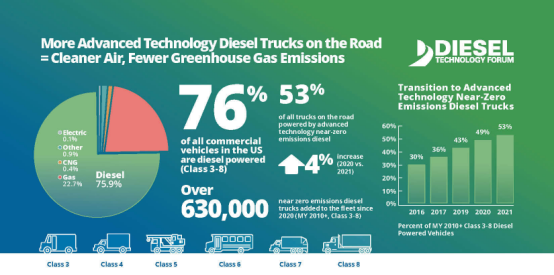Jun. 12, 2023
Diesel engines have long been the unsung heroes of the commercial trucking industry, propelling a staggering 76% of all commercial trucks and playing a vital role in transporting nearly 70% of the nation's freight tonnage.

The trucking industry serves as the lifeline for delivering a diverse range of goods, from industrial products and construction materials to everyday consumer items and essential groceries. With an impressive fleet of over 15 million registered commercial vehicles in the United States, it's worth noting that a whopping 76% of these trucks rely on the power of diesel engines. These mighty engines serve as the indispensable tools employed by the nation's 711,000 trucking companies, empowering approximately 3.5 million drivers to efficiently transport freight and sustain the nation's economy. Notably, an overwhelming 97% of the largest highway tractor-trailer trucks, known as Class 8 vehicles, heavily rely on the robust performance of diesel engines. Furthermore, three out of every four smaller and medium-duty commercial trucks also owe their power to diesel.
The popularity of diesel as the technology of choice for commercial trucks dates back to the late 1960s. Its reign continues today due to an unparalleled combination of features that diesel engines offer. These include high power density, exceptional energy efficiency, impressive uptime and reliability, exceptional durability that can endure over a million miles, extensive driving range, significant payload capacity, access to a global network for parts, servicing, and fueling, high resale value, compatibility with low carbon renewable biodiesel fuels, and a remarkable reduction in emissions. In fact, heavy-duty diesel trucks and buses have made remarkable strides in emissions reduction over the past two decades, achieving a staggering 95% decrease in nitrogen oxide (NOx) emissions and a commendable 90% reduction in particulate emissions. Today's trucks emit such minuscule levels of pollutants that it would require 60 new trucks to match the emissions of a single truck manufactured back in 1988.
While electric vehicles have been gaining admiration in recent years, diesel engines remain an unwavering force to be reckoned with in the heavy-duty vehicle sector. Allen Schaeffer, the esteemed executive director at the Diesel Technology Forum, asserts that diesel engines provide unmatched power density, extended driving ranges, a diverse array of vehicle types and configurations, and continuous advancements in environmental performance, with a steadfast commitment to achieving near-zero emissions. In fact, an astonishing three-quarters of all commercial vehicles in the United States are powered by diesel, including an astounding 97% of the formidable over-the-road Class 8 big rig trucks. Even as we look to the future, industry experts from IHS Markit predict that diesel technology will continue to dominate the heavy-duty transport sector until 2040, albeit with a gradually declining market share. Remarkably, as of now, 43% of diesel commercial vehicles are already equipped with the latest generation of advanced and cleaner diesel technology, marking a significant 6.8% increase compared to the previous year.
One remarkable solution for further reducing emissions lies in biodiesel blends. These blends have the advantage of being compatible with any diesel vehicle, whether old or new, without requiring modifications. Jennifer Weaver, the astute OEM market development manager at the National Biodiesel Board (NBB), emphasizes that biodiesel blends, particularly B20, can reduce emissions by an impressive 80% compared to petroleum diesel. Many original equipment manufacturers (OEMs) already endorse the use of B20 biodiesel blends, and some are even exploring higher blends like B40 and beyond. With the added advantage of immediate access to a comprehensive nationwide and global refueling infrastructure, there is no need for costly investments in new vehicles or infrastructure.
According to the International Energy Agency (IEA), global biodiesel and hydrotreated vegetable oil (HVO) production reached a remarkable 48 billion liters in 2019. However, due to the global Covid-19 pandemic and reduced demand, production is expected to contract by approximately 5% to 46 billion liters in 2020, primarily impacting the European markets. However, European production is projected to rebound in 2021, coupled with ongoing growth in the Association of Southeast Asian Nations (ASEAN) and the United States. As a result, global biodiesel and HVO output is predicted to reach an impressive 53 billion liters in 2021 and further rise to 56 billion liters by 2022. Looking ahead to the years 2023 to 2025, average production is anticipated to reach a staggering 63 billion liters, representing a substantial 30% increase from the 2019 level. This growth can be largely attributed to the expansion of HVO production in Singapore and the United States, which account for over half of the projected increase.
As we navigate the future of commercial trucking, diesel engines stand as the tried and true workhorses, combining power, efficiency, durability, and environmental progress. With their unwavering presence and continuous advancements, diesel engines continue to play a pivotal role in driving our economy forward while ensuring a sustainable and efficient transportation system.
If you want to know more information, welcome contact us or click to the website: https://www.fawde.com/
Related News
Volvo CE and FAWDE Launch Global Cooperation Project
Sep. 29, 2025
Good News! Engine Division Wins First Month’s Open Doors
Feb. 05, 2021
Obtained Euro Ⅵ-e Emission Certification, Jiefang Power And Boosting Global Voice Of China Power
Feb. 05, 2021
Chúng Tôi Sẽ Dành Này Tết Nguyên Đán Ở Nước Ngoài
Feb. 09, 2021
Why? Emancipation Power Promotes Global Discourse Power Of China Power!
Feb. 26, 2021
Apr. 23, 2021
Related Products
Contact Us
Navigation
Navigation